Magnificent Warriors (1987)
Directed by: David Chung
Written by: Kan-Cheung Tsang
Starring: Derek Yee, Lowell Lo, Michelle Yeoh, Richard Ng
AKA SHONG HUA ZHAN SHI, CHINA WARRIORS, DYNAMITE FIGHTERS, YES MADAM 3
HONG KONG
AVAILABLE ON BLU-RAY: 2OTH FEBRUARY: from EUREKA ENTERTAINMENT
RUNNING TIME: 91 mins
REVIEWED BY: Dr Lenera
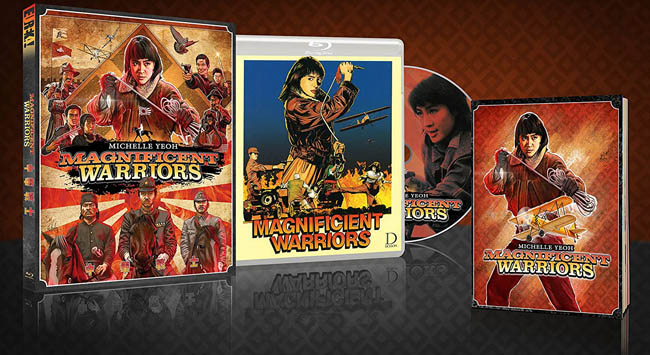
Some time between 1937 and 1945: Manchuria under the occupation of the Japanese. Chinese agent Matsin overhears that a Japanese factory containing poison gas is being built in Kayi City in Puttan. Meanwhile Chinese airplane pilot / secret agent Fok Ming-ming is sent to the very same to capture its cowardly leader Prince Youda, who has important information about the Japanese there. She’s told to make contact with “Secret Agent 001”, though first she ends up befriending conman Paulina Wong who pretends he’s 001 when she helps him out of a fix and he smells money, before finally encountering the real 001 who’s of course Matsin, her on / off boyfriend, plus also rebellious princess Chin-chin….
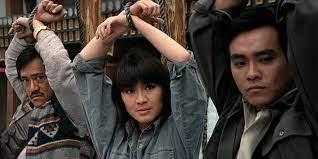
Well, the plot really is a bit all over the place; for example we never find out what this seemingly very important [considering that much of the plot is driven by it] information that Youda possesses. It can’t be a poisonous gas factory being built in the very same town, because Matsin and we find this out really early on, with Ming-ming doing so not long afterwards. But then why am I beginning this review by criticising the film in question when it’s still great, rip-roaring fun that’s driven at a furious pace by director David Chung [returning from Royal Warriors along with some others], and only truly weakened by a really rather dire musical score that doesn’t do the movie justice at all. Though not nearly as well as known as it should be, it might be the best ever showcase for Michelle Yeoh’s physical talents, with rarely more than ten minutes passing without her punching, kicking and leaping [remember that she wasn’t a martial artist and was just trained on set in what she had to do], even though her character could have been played by a man with very few adjustments to the script. Performing in this film wore her out so much it put her off doing action movies for some time after. The mixture of two-thirds thrills, one-third comedy is just right, even though we wish we had more scenes between Yeoh and Lowell Lo – their characters don’t seem like romantic partners at all until at the end, even though they are. It’s often described as being Indiana Jones-influenced despite its heroine displaying whip skills that Dr Jones wouldn’t dream of, and it’s easy to why, though I wonder if High Road To China, starring Tom Selleck who almost played the great man himself, was as much of an inspiration – some elements and situations are very similar. A general Hollywood vibe seems to be partly intended, so the result often looks and feels like the ‘eastern’ / western’ Millionaire’s Express.
Yeoh’s introduction is great: after a shot of her plane flying, we cut to it parked right on a mountainside and shots of her feet, hands, back, anything besides her face until ten seconds has passed. She and her companion go to the local village where the latter does his best to sell guns to the villagers, claiming that the rifles were the only reason why the Japanese were able to conquer the northern part of China. One not-very-strong old local insists on firing one on somebody else’s shoulder, and accidentally kills Ming-ming’s helper. Ming-ming kindly says that she doesn’t want revenge, just her helper’s share, but of course the villagers aren’t too keen on this idea, so she launches into action, wielding her whip with astonishing accuracy and ferocity, knocking any firearm out of its user’s grasp while striking and booting with flair, before she flees in a wagon across a bridge before turning round and revealing that said wagon contains a gatling gun which she uses to blast away the bridge. Of course this is probably just a typical day in the life of Ming-ming, but now we switch to Matsin in a scrape of his own. Two policemen, played by veteran screen fighters Fung Hark On and Lo Meng who are also two of the three action choreographers, chase him through a market and one is injured in the arm by Matsin’s crossbow. Matsin secretly meets with a guy who tells him that his identity has been discovered [duh, it seemed bloody obvious from the previous scene] and overhears chat about this factory to which supplies are being delivered in four months. Seen, he narrowly escapes, while in the next scene Ming-ming’s grandfather narrowly escapes with his hand when accosted by some Japanese to be fortunately rescued by Ming-ming. All this, and we haven’t even got to our mission yet!
Ming-ming is sent to Kayi, and we get some spoofing cliches when Ming-ming asks, with regard to 001, “Where do I find him”? “Just remember this watch” is the reply. Said watch is on its way via carrier pigeon, but is intercepted by a hungry Paulina Wong [a man, not a woman] who takes the watch and eats the bird. The conman, who’s probably wanted by the police all over Manchuria, is pursued by bounty hunters in Kayi , though Princess Chin-chin turns up to save him from the wrath of both them and villagers whom he’s cheated while throwing dice. Ming-ming notices the watch on his wrist and of course assumes that he’s 001, something that Wong is more than happy to go along with, though he’s then approached by the same two policemen who were chasing Matsin. Kayi’s head Youda is a puppet of the Japanese, despite having a sister in Chin-chin who’s certainly not of that ilk. The big question is, when Youda will see the light?@ The moment when he eventually so is a great scene, with villagers going wild and chanting his name. Indeed the latter, while characterised en masse, play an important part, us given the impression that, despite the skills displayed by some of our main protagonists, they may not have succeeded without their input. A story which progresses as a series of rescues and chases eventually winds up with a battle which, despite the film’s large budget [by Hong Kong standards], is a bit too small on extras to totally convince yet is still well staged, does excite, and provides a lot of cool moments. Who doesn’t love seeing guns meets their match in traditional weapons such as spears and rocks? Can Return Of The Jedi have been responsible for this? Hardware is often very cool, but I always have to stop myself from cheering from moments such as Stormtroopers and Scoutwalkers falling victim to sling shots and booby traps. The ending is quite kind to the Japanese despite the nationalism displayed earlier, no doubt because Japan was a major territory for Hong Kong film releases at the time.
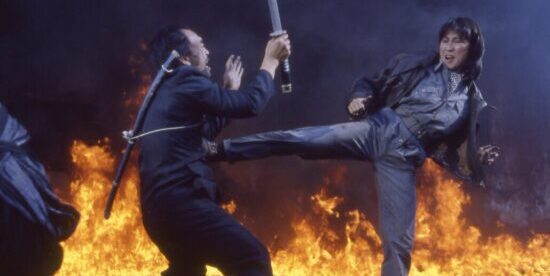
Yeoh’s ballet background gives her incredible flexibility, while she also projects the necessary force. After the opening set piece, Ming-ming saves her grandpa and, using a rope dart, skillfully battles two men, with plenty of slow motion to show that it’s really her performing most of the action with an undoubtedly cumbersome weapon. One opponent has a sword, and the resulting exchange is so good that one just wishes it were longer. Soon after this, Ming-ming is flying and harassed by an enemy aircraft. Good and sometimes interesting angles, plus Ming-ming’s method of outwitting her aggressor so that she’s even able to wave to him, atone for the obvious speeding up, an element that slightly hampers a few fight moments, especially near the end; we’re used to under cranking in Hong Kong action cinema, but there are times when it looks silly [i. e. the final race in Thunderbolt]. Still, when there’s so much genuinely good stuff happening we shouldn’t complain too much. When Yeoh and Lowell, who’s already had a minor brawl of his own plus a motorbike jump for a stuntman, take on Hark On and Meng, the fighting steps up a gear with powerful hits. Ming-ming’s flight around Kayi has her wield a spear with startling dexterity while encountering multiple opponents, the high point being her jumping onto a pole and swinging on it to kick some opponents. The final battle may emphasise other things but we get a stunning shot of Yeoh spin-kicking the thick wooden post of a flaming shelter, causing the roof to collapse on her opponent. Elsewhere Cindy Lau Chin-Dai as Chin-chin shows off a few moves in a mid-point fight which makes it disappointing that she doesn’t do more except a bit in the climax where she and Yeoh fight none other than Hwang Jang-Lee, though it’s really short. Hwang lurks around as a henchman throughout and briefly battles Yee, which is a huge waste of his talents.
Ming-ming is such a fearless flyer that she doesn’t require goggles and is able to calmly eat a sandwich while up in the air. She also constantly grins. There’s a really good comedy sequence when Chin-chin is helping Wong out of a mess where he’s cheated; the argument over “Who was wrong” translates well into both English subtitles and English dubbing and proves that verbal humour can travel well. Unsurprisingly most of the comedy revolves around Richard Ng, whose role as Wong may be typical but is at least a very large one which also showcases his serious acting skills. I’ve come to the conclusion that his talent was terribly underused. We even buy him getting into the action, be it firing two guns at once or using a wooden device to fire a group of spears – which all immediately fall to the ground. In general Hong Kong humour has grown on me [though are still moments in the Lucky Stars films which grate], but there’s no doubt that it can wreck havoc with pacing. Police Story may contain some of Jackie Chan’s most iconic work, but it does substantially slow down when it turns funny. Magnificent Warriors doesn’t really do this, the jokes being extremely well integrated [even the age-old “woman embarrassed at seeing a man’s cock“ thing which here is a sister seeing her brother!], though at times one might wish for some slowing down so we can better enjoy the chemistry which Yeoh and Yee definitely share despite Yee being rather bland in general, something that may have been noticed along the way seeing as Ng is really the male lead and playing a character who develops. A scene of flirting between Ming-ming and Matsin would be welcome – after all, they’re supposed to be a couple. One sort of gets the impression that they just get together when they feel like it, but couldn’t the script by Kan-Cheung Tsang have been a bit more obvious about this without disrupting the generally kid-friendly, mostly bloodless, action-emphasising feel of the piece? There is though quite wonderful break from the mayhem when Ming-ming, Matsin and Wong are tied up awaiting execution, and they tell each other about themselves.
The beady eyed can have fun spotting anachronisms, while the score by Joseph Chan Wing-Leung repeats an average main theme over and over again with no change in arrangement, with only two electronic pieces, one no more than a drum-like passage, to break it up. It’s quite tedious. But in the end I’m probably doing what I kind of said I wouldn’t do at the beginning of this review. Probably intended as a really epic production that would rival Hollywood in production values, Magnificent Warriors ended up falling a bit short. It should have been a true Hong Kong classic that also broke majorly into the West. Yet it still delivers in terms of thrills and spills, and really should be to “go to” film to show somebody the physical skills of the legend that is Michelle Yeoh.
Rating: 









SPECIAL FEATURES
Limited Edition O-Card slipcase featuring new artwork by Darren Wheeling [2000 copies]
1080p HD presentation on Blu-ray of the original theatrical cut (including the films’ original theatrical ending previously cut from most home video releases) from a brand new 2K restoration
Magnificent Warriors was shot in a widescreen format typical of many Hong Kong films of the time, which means that there are instances when characters are a bit squashed on the sides of the frame; most notable is one at the very end. This is no fault whatsoever of the restorers. However, there are some other issues which I feel I should mention, even if the film still probably looks the best it ever had [immensely better than my DVD]. Grain sometimes suddenly becomes really heavy and clustered, and some other shots look as if they’ve tried to remove most of the grain digitally, resulting in some shots, including ones of faces, becoming blurry and / or lacking detail, though elsewhere detail levels sometimes reach levels of considerable impressiveness. Colours do generally look good despite the rather unappealing brown-dominated palette which was chosen by the three cinematographers, so this is not at all a bad restoration, just a rather flawed one which doesn’t reach the heights that we’ve come to expect. Why do some restoration companies still insist on meddling? It only results in the replacing of picture flaws with other and often more glaring picture flaws.
Cantonese and English audio options (both in their original mono presentations)
The English dub is about average based upon the few seconds I heard. One of the most enjoyable things about the Hong Kong version is that Derek Yee is clearly dubbed by Jackie Chan’s usual voiceover artist in Hong Kong films up to Police Story 3: Supercop when they began to shoot with synch sound.
Optional English Subtitles, newly translated for this release
Brand new feature length audio commentary by Asian film expert Frank Djeng (NY Asian Film Festival)
Cheng works well with others in talk tracks, most notably Michael Worth, but I think I like him best when he’s going solo; he isn’t rushing so much to give us as much information as much as possible [even though he always maintains clarity] and maintains interest even when doing pot biographies [my main audio commentary dislike, especially when of people that most listeners will know a fair bit about!] because of his pulpable enthusiasm. This one, which begins with him appropriately calling the film Indiana Jane, is a top class example of how to do this thing right. We have pointed out things which most of us would never notice, such as a Ming-ming’s early companion talking in both Mandarin and Cantonese before settling on Mandarin, get a lot of context such as a brief history of D & Films, and talk about the film such as pointing out details about scenes and telling us that Ng’s final speech being originally cut for early home viewing releases, despite their obviously not being much production information around.
Brand new feature length audio commentary by action cinema experts Mike Leeder & Arne Venema
You know that this is going to be an especially lively and light hearted Leeder and Venema effort when Venema asks Leeder “how’re you doing sir”?, and Leeder replies “Sorry, I didn’t know that we were being posh”, while later on the chat turns to Leeder marrying Lo [all will make sense when you listen]. Venema tells a hilarious story about when he was in film school and a student stole the principals’s pigeon and stashed it in the very same principal’s fridge with gthe words “do not touch this, this is my pigeon”, but Leeder tops with an amazing tale about Hwang killing somebody which I won’t relate so I don’t ruin the surprise. Stanley Tong, who seems to have done a third of the stunts in the movie, is pointed out several times. Surprisingly they don’t like the dialogue sequence I praised earlier, but we can’t agree on everything and it’s nice to have commentators who point out what they see as flaws: Leeder even thinks that a more elaborate ending was intended before money and time ran out, or another reason. I want to hang out with these guys getting drunk while discussing Hong Kong action cinema.
Archival interview with Michelle Yeoh [5 mins]
Yeoh, who looks like she’s taking a brief break from filming or some similar activity, begins by saying “It was the toughest film I ever worked on” and “I never thought I’d do a film again”. The promised three weeks doing the action became three months. However, she doesn’t express regret. She describes her character and the whip being a device to keep people at a distance, and compares cheap Hong Kong films with big American ones where the budget is often not seen on camera. Yeoh is as delightful as ever, but the film clips are presented in a distracting way, with one small screen in which the footage plays clearly surrounded by a bigger one where the visuals are blurred. But then Hong Kong Legends, the DVD of which this came from, did have a tendency to present interviews oddly, like having very strange techno playing behind the talk.
Archival interview with action choreographer Tung Wai [13 mins]
This comes from the Region 1 DVD from 2oth Century Fox. Wai tells a lot about his aproach to filming the action [“I like to design the action around the situations of the scenes”, and also compares American with Hong Kong filmaing, but is most interesting when asked about three luminaries. He’s revealingly cold about Jackie Chan, with whom he worked with on City Hunter, but praises Sammo Hung for saying, after he outlined how to shoot a fight, “this might not be the way to do it, maybe you could do better”, and mentions Bruce Lee being extremely thin but certainly able to do all these things that mere mortals cannot.
1984 Guy Laroche advertisement with Jackie Chan and Michelle Yeoh [1 mins]
And here’s a nice little treat which the otherwise identical Blu-ray release on Region A by 88 Films doesn’t have; Chan and Yeoh’s first instance of working together in a advertisement for watchest. Beside a lake Chan is riding a horse, Yeoh a bike; an accident ensures but all turns out right. Obviously it’s very tacky but great to have.
Trailers
Reversible sleeve design
A Limited Edition collector’s booklet featuring new writing by James Oliver [2000 copies]
Though flawed in some aspects, “Magnificent Warriors” kicks nonstop ass and is a great film to watch with the kids. Eureka’s release isn’t the most packed affair but still goes one up on the Region A 88 Films release with the inclusion of the Guy Larouche advert. Recommended!



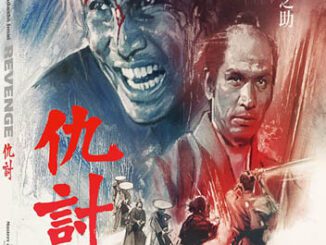
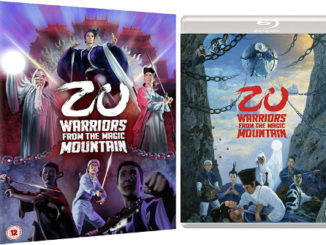
Be the first to comment